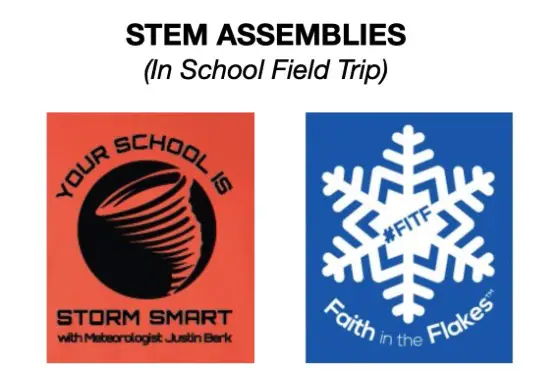October 17, 2024
When a full moon occurs at a point in the orbit around Earth when it is at its closest, it is called a Supermoon. This can make the moon appear as much as 8% larger and 15% brighter. The size is more noticeable when it rises and sets, but the brightness can seep through your windows at night and keep nocturnal animals extra active.
Tonight we will experience the third of four supermoons in a row. This one is the closest and brightest of the year. It also comes with the additional sky show of the ATLAS A3 Comet to the west. Two great shows on opposites ends of the sky.
Simply Put:
The moon will rise in the East roughly the same time as the sun sets in the West.
Based on the central office area around Baltimore: Look west between 6:26 PM and 7 PM for the moon to rise depending on any obstructions such as trees, buildings, or hills.
The comet will become visible 45 minutes to 1 hour after sunset. I have personally had my best luck after 7:30 PM.
What Makes This So Special
The distance between the moon from Earth is 222,055 miles away. This will be the CLOSEST AND BRIGHTEST of the year. Yes, we have had 4 in a row, but this is the main show.
This is also The Hunter’s Moon. It was named by hunters who use the extra light to hunt for fattened deer and foxes.
See more on the supermoon below.
Moonrise October 17 2024
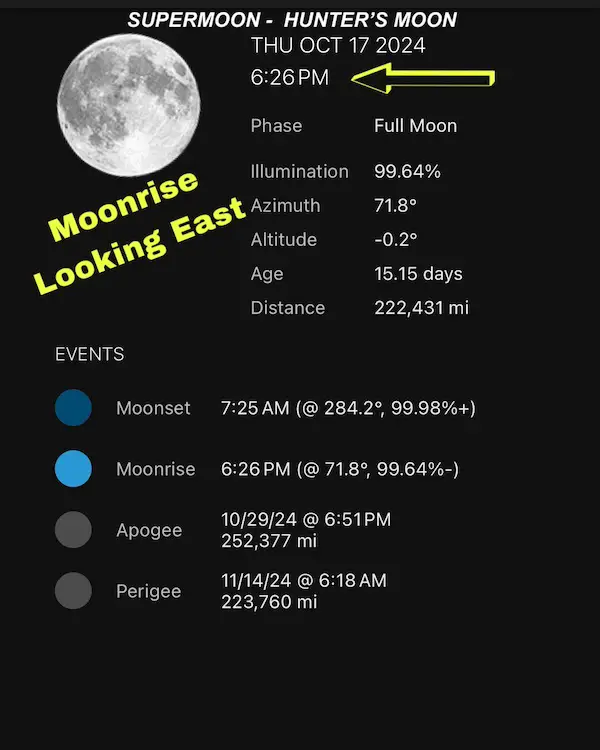
Comet Viewing: October 17
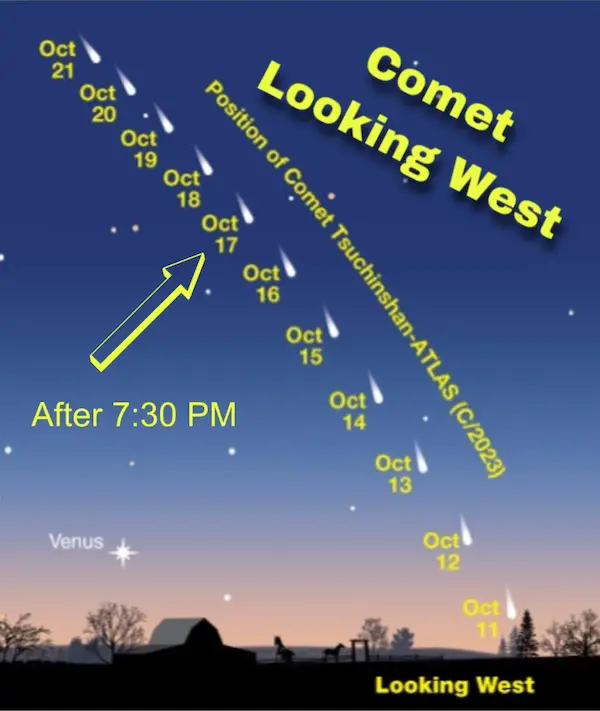
What You May See
Baltimore Maryland
This is the famous Natty Boh sign captured by my friend Konstantine Mamalis.
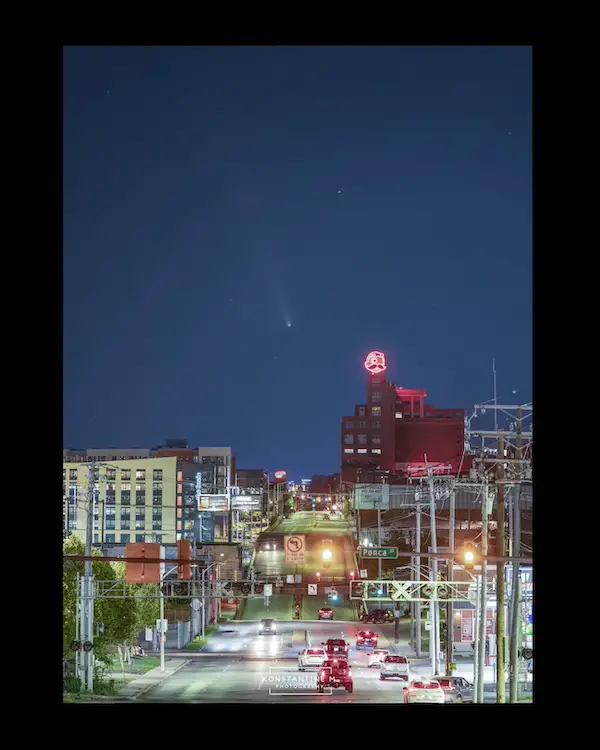
Pilot’s View from 38,000 Ft
Moon’s Elliptical Orbit Around Earth
The cycle around Earth is not a perfect circle; it is an ellipse. The closest part is called the perigee, and the farther away it is the apogee.
The orbit of the moon around Earth is an ellipse rather than a circle. That shape means there are times when the two bodies are far apart (apogee) and close together (perigee).
- The average distance is 238,900 miles
- This Full Moon was 222,131 miles away on the night of September 17. Tonight’s full moon will be even closer.
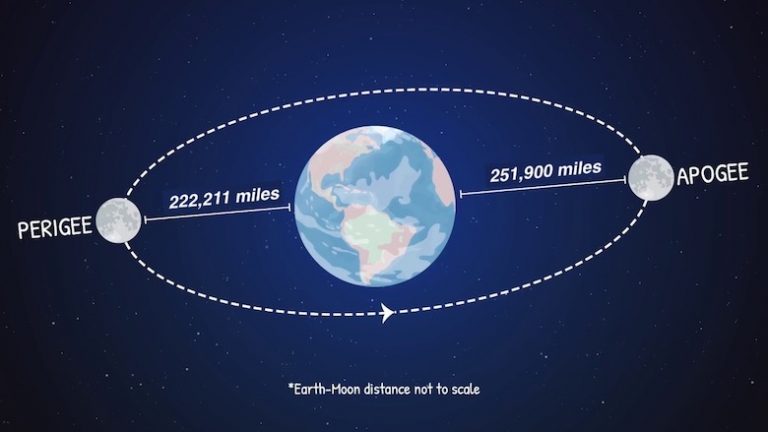
The unique alignment of the full moon with the elliptical orbit means that a few full moons in a row can be supermoons, occurring within a day or two of the perigee or closest part of the orbit. This year, we have four months of full moons in a row with Supermoons. The first of this cycle was on Monday, August 19th, 2024. The second was on Tuesday, September 17. The next one is tonight, October 17, which will be closer, followed by the last of this group in November.
What Is A Supermoon
This supermoon will be the third of four in a row. The full moon will occur while the illumination is within 90% of the perigee, making the moon appear larger and brighter than average.
The full range can be a micro-moon or a full moon at apogee; the supermoon will appear 14% larger and 30% brighter.
But compared to average, we can expect 8% larger and 15% brighter.
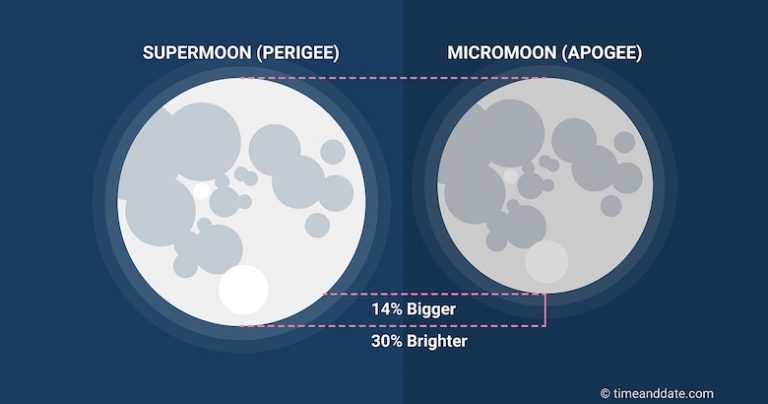
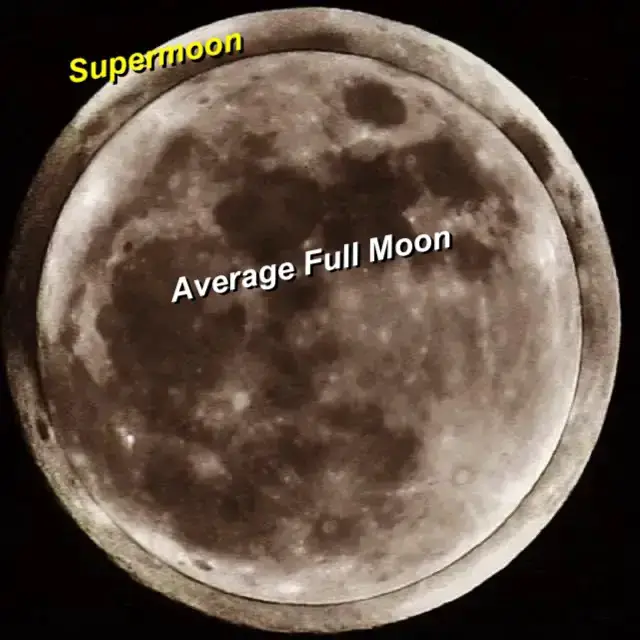
Where to look?
Simply put, it rises in the East and sets in the West. It will be in the Eastern Sky for the Western US.
The 2024 Supermoon Collection
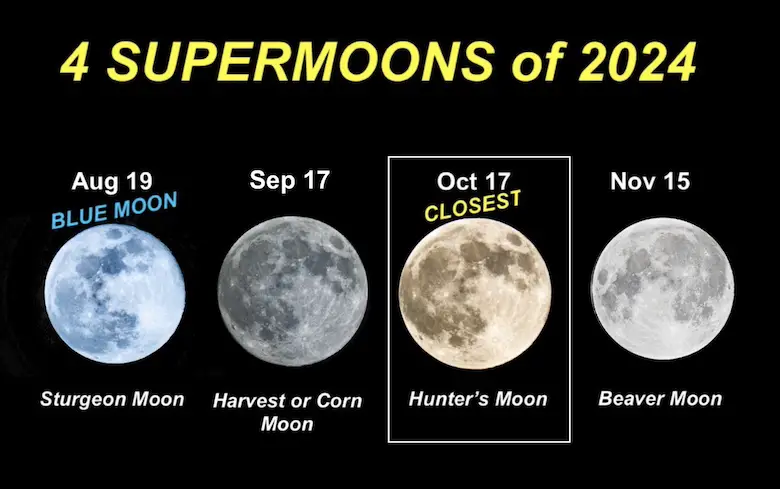
FIRST: Full Supermoon August 19 A Blue Moon
224,917 miles away
Moonrise in Baltimore 8:16 PM EDT. Note it can take 30 minutes or longer in some areas to see the moon rise if there are obstructions from trees, hills, or buildings.
Also known as the Sturgeon Moon, it was named by Native American Tribes because the number of fish increases this time of year.
This is a Blue Moon based on the original definition of a fourth full moon in a season. The more modern adjusted definition is for when a second full moon occurs in the same month, but that is not the case this time.
SECOND: Full Supermoon September 17
222,131 miles away
Also, Harvest Moon or Corn Moon. This was named by farmers as the extra light allowed for harvesting into the night.
There will be a partial lunar eclipse, but with only about 3% abstracted, it will not be noticeable.
TONIGHT/THIRD: Full Supermoon October 17
222,055 miles away. This will be the CLOSEST of the year! That means the largest and brightest as well.
This is also The Hunter’s Moon. It was named by hunters who use the extra light to hunt for fattened deer and fox.
FOURTH: Full Supermoon November 15
224,853 miles away.
This is also known as The Beaver Moon because Native Americans saw beavers setting traps or more actively building winter dams.
It is also called The Frost Moon, as it can correlate to the first frost of the season.
Comparison
Closest Supermoons Between 2016 and 2026
November 14, 2016 221,533 miles
December 3, 2017 222,443 miles
January 2, 2018 221,583 miles
February 19, 2019 221,734 miles
April 8, 2020 221,851 miles
May 26, 2021 222,117 miles
July 13, 2022 222,089 miles
August 31, 2023 222,043 miles
October 17, 2024 222,056 miles
November 5, 2025 221,817 miles
December 24, 2026 221,668 miles
Subscribe for eMail Alerts
Weather posts straight to your inbox
Sign up and be the first to know!
Please share your thoughts and best weather pics/videos, or just keep in touch via social media.
-
Facebook: Justin Berk, Meteorologist
-
Twitter
-
Instagram
SCHEDULE A WEATHER BASED STEM ASSEMBLY
Severe Weather: Storm Smart October and next spring
Winter Weather FITF (Faith in the Flakes): November To March
Click to see more and send a request for your school.
THANK YOU:
Baltimore Magazine Readers Choice Best Of Baltimore
Maryland Trek 11 Day 7 Completed Sat August 10
We raised OVER $104,000 for Just In Power Kids – AND Still Collecting More
The annual event: Hiking and biking 329 miles in 7 days between The Summit of Wisp to Ocean City.
Each day, we honor a kid and their family’s cancer journey.
Fundraising is for Just In Power Kids: Funding Free Holistic Programs. I never have and never will take a penny. It is all for our nonprofit to operate.
Click here or the image to donate:
RESTATING MY MESSAGE ABOUT DYSLEXIA
I am aware there are some spelling and grammar typos and occasional other glitches. I take responsibility for my mistakes and even the computer glitches I may miss. I have made a few public statements over the years, but if you are new here, you may have missed it: I have dyslexia and found out during my second year at Cornell University. It didn’t stop me from getting my meteorology degree and being the first to get the AMS CBM in the Baltimore/Washington region.
One of my professors told me that I had made it that far without knowing and to not let it be a crutch going forward. That was Mark Wysocki, and he was absolutely correct! I do miss my mistakes in my own proofreading. The autocorrect spell check on my computer sometimes does an injustice to make it worse. I also can make mistakes in forecasting. No one is perfect at predicting the future. All of the maps and information are accurate. The ‘wordy’ stuff can get sticky.
There has been no editor who can check my work while writing and to have it ready to send out in a newsworthy timeline. Barbara Werner is a member of the web team that helps me maintain this site. She has taken it upon herself to edit typos when she is available. That could be AFTER you read this. I accept this and perhaps proves what you read is really from me… It’s part of my charm. #FITF




